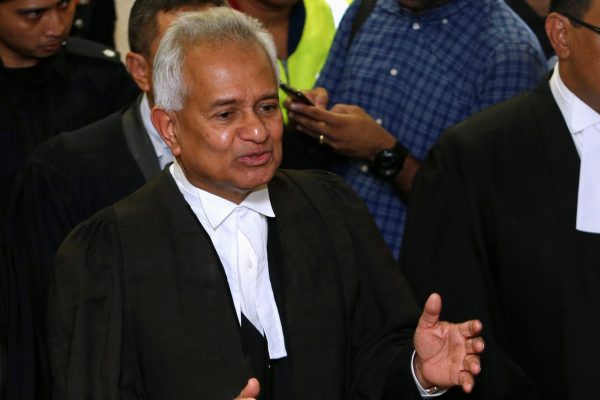In September 2018, Prime Minister Mahathir Mohamad announced the government’s intention to ratify all remaining core United Nations instruments related to the protection of human rights. But after facing significant backlash from conservative Malay-Muslims in both parliamentary opposition and civil society, the government backtracked on the announcement in November 2018. Bizarrely, the Johor royalty led the charge in pressuring the government into withdrawing from the Rome Statute by claiming that the treaty undermined the royal institutions.
The Rome Statute covers four major crimes — genocide, crimes against humanity, crimes of aggression and war crimes. Johor Crown Prince Tunku Ismail Idris (popularly known as TMJ) claims that ratifying the Rome Statute allows those who oppose the royalty to construct war crimes accusations in order to have the sultans arrested.
But given that the royals have symbolic rather than executive power, the TMJ’s worries are out of place. The ICC is also a court of last resort — legal proceedings can only begin there after all domestic options are exhausted.
The government has refuted the issue. On 27 April 2019, Attorney General Tommy Thomas explained that under the constitutional monarchy system practised in Malaysia it is the government, not the King, that would be held accountable for decisions relating to war. Referring to the four crimes, Thomas said that they were also far removed from the ‘reality’ of a peaceful Malaysia.
A more plausible reason behind the concerns towards the Rome Statute could be that states which become party to the treaty are expected to subsequently pass domestic bills which are compatible with the legal principles of the Rome Statute. The central principle of the treaty is that no individual can be immune from prosecution.
But Thomas has reportedly said that legal immunity for royalty has long been lost, perhaps since the constitutional amendments during Mahathir’s first tenure as prime minister three decades ago. These 1993 constitutional amendments may have curbed many of the immunities but nevertheless, articles 181 to 183 of the Malaysian Constitution explicitly state that charges can be brought against a sitting royal (king or sultan) through a special court for those crimes allegedly committed in a personal capacity.
Yet therefore, a king or sultan operating in an official capacity still receives prosecutorial immunity. To its critics, ratifying the Rome Statute could provide the government an opportunity to completely remove the immunities. The fact that Mahathir’s first tenure as prime minister saw confrontation between the royalty and the government serves as sufficient precedent for some to believe that he may be attempting to still further reduce royal influence.
Since Mahathir grudgingly announced his intention to withdraw from the ICC, opposition to the Rome Statute still appears to have gathered new life among certain quarters. Parliamentarians from the opposition United Malays National Organisation (UMNO) party argue that, while the previous Barisan Nasional (BN) government studied the prospects of ratifying the Statute, the then attorney general cautioned against doing so. The BN government at the time had apparently figured that it may contravene the Federal Constitution and that the Council of Rulers would need to be consulted.
However, Thomas pointed out that the former Najib administration did in fact decide that Malaysia ought to accede to the Rome Statute but simply never followed through with it. He claims that the PH government was merely continuing a policy decision undertaken by them. Former prime minister Najib Razak responded by stating that PH should look into why BN eventually refrained from pushing through the treaty’s ratification.
On 4 May 2019, a coalition of Muslim non-governmental organisations, the Gerakan Pembela Ummah, organised a rally to protest the Rome Statute. Estimates of participants range from 1000 to 10,000, depending on who to believe. Most were members of Ummah-linked NGOs, UMNO grassroots members and members of the Parti Islam Se-Malaysia opposition party.
These groups, which contain pro-royalists, the political opposition, and some Islamic NGOs, characterise the Rome Statute as an attack, not just against the royalty but against Malay-Muslim rights by extension. To beef up this narrative, Ummah used the 4 May rally to simultaneously criticise the Rome Statute as well as the death of firefighter Muhammad Adib Mohd Kassim. Whereas Ummah contends that Adib, who died from injuries sustained at the Seafield Temple Riots, was a victim of communal violence, the government’s inquest into his death has thus far suggested that he was mortally wounded after a fire truck backed into him. Ummah argues that the government has sought to avoid holding non-Muslims responsible for a Muslim’s death. Connecting these issues effectively reinforced the discourse that the PH government consistently undermines Malay-Muslim rights.
Despite the rally’s limited magnitude, PH inadvertently handed the opposition the opportunity to once again criticise policies as against the rights of Malay-Muslims.
Claims that PH’s tenure threatens Malay-Muslim rights are clearly driven by political motives, but they have been gaining traction. Similar rhetoric will likely be heard in the months ahead, especially since it seems to be effective in forcing PH to backtrack on its reform agenda.
It would be prudent for PH to engage in deeper consultation with various stakeholders before proceeding with potentially divisive policies such as the ratification of the Rome Statute. At the same time, consultations could also mean the policymaking will be slow and potentially held hostage to other issues.
There is no easy solution but one thing known for sure is that the PH government cannot afford too many backtracking episodes without losing its credibility.
Prashant Waikar is a Research Analyst with the Malaysia Programme at the S. Rajaratnam School of International Studies (RSIS), the Nanyang Technological University (NTU), Singapore.
A version of this article originally appeared here on RSIS.

